A Descriptive Essay is a category that describes something such as a place, object, experience, situation or emotion, etc, in a detailed and vivid manner.
It requires the writer to use his/her creative writing ability to paint a picture in the reader’s mind by providing a comprehensive account of the experience. This essay is often assigned to students in high school and in composition classes.
The writer of a descriptive essay has the creative freedom to use precise language to describe his/her subject/topic.
12 Best Descriptive Essay Examples
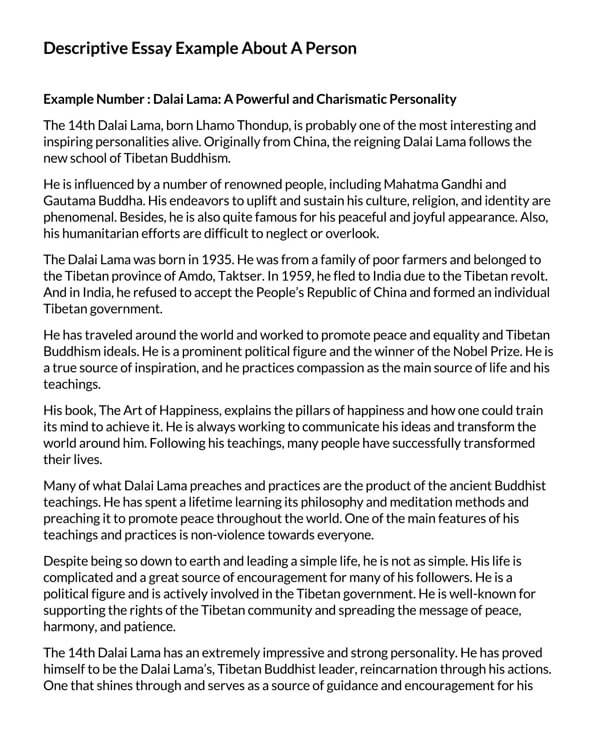
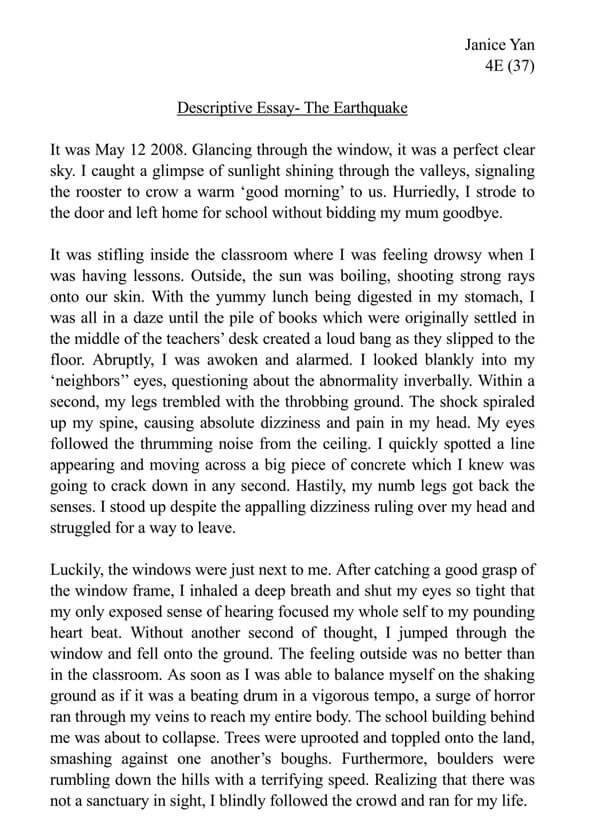
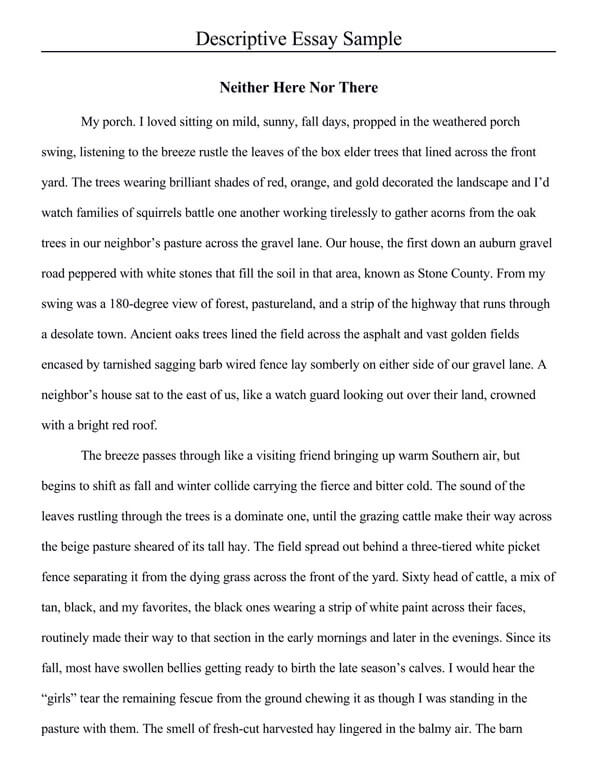
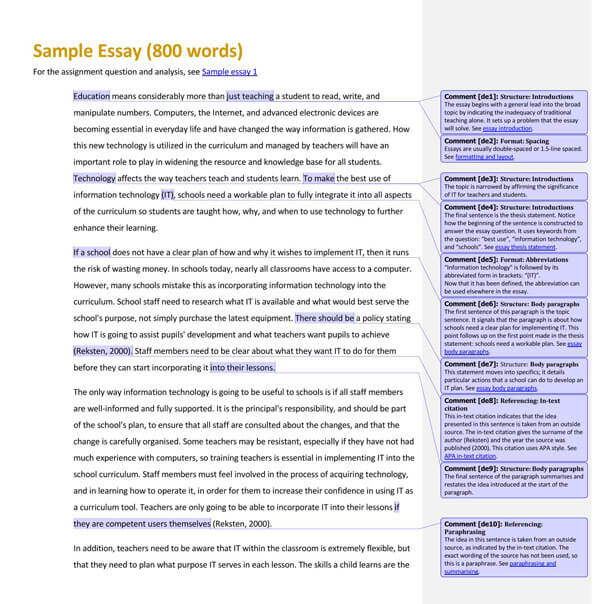
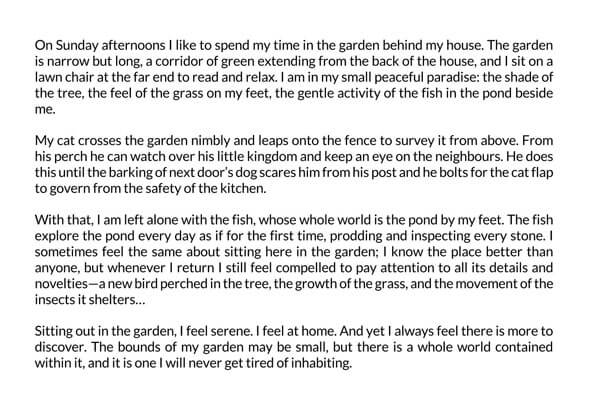
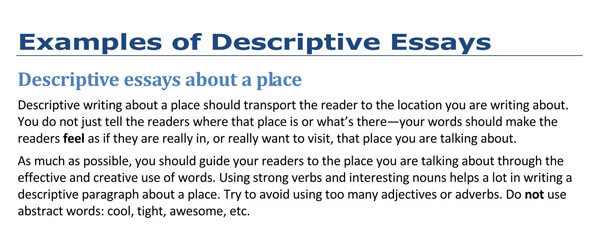
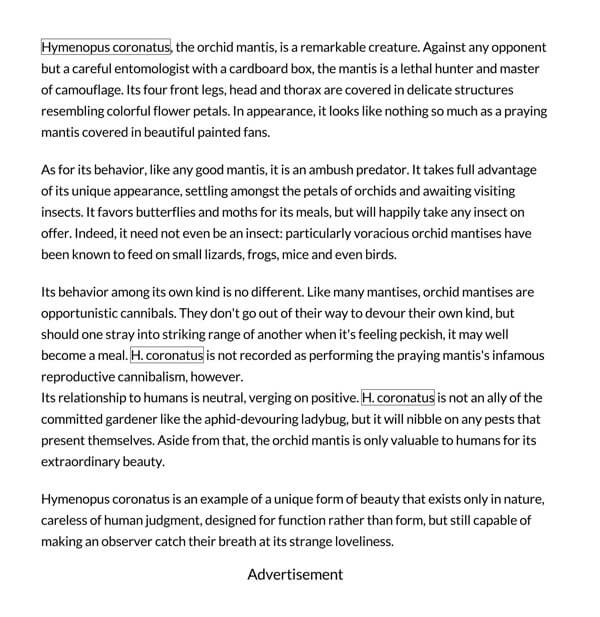
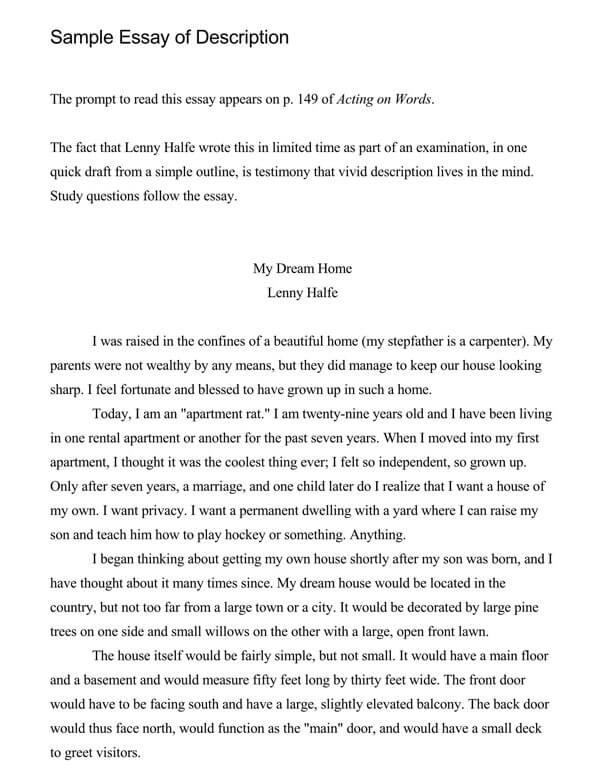
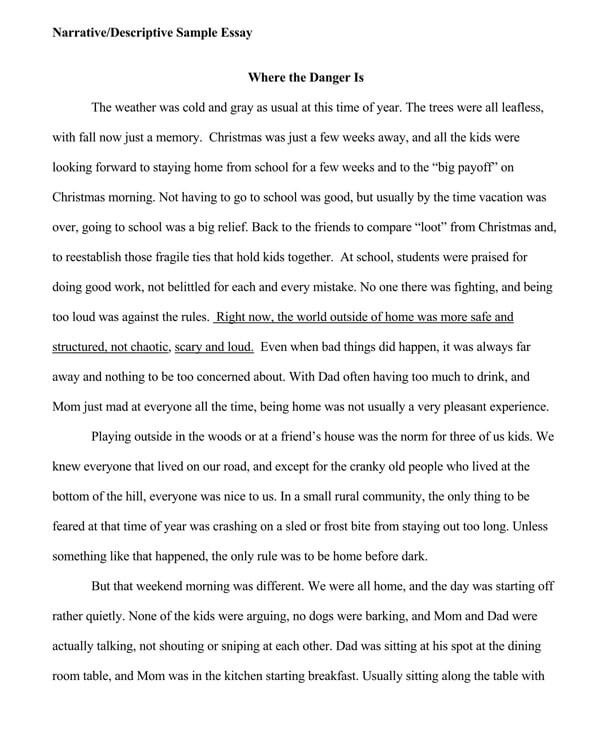
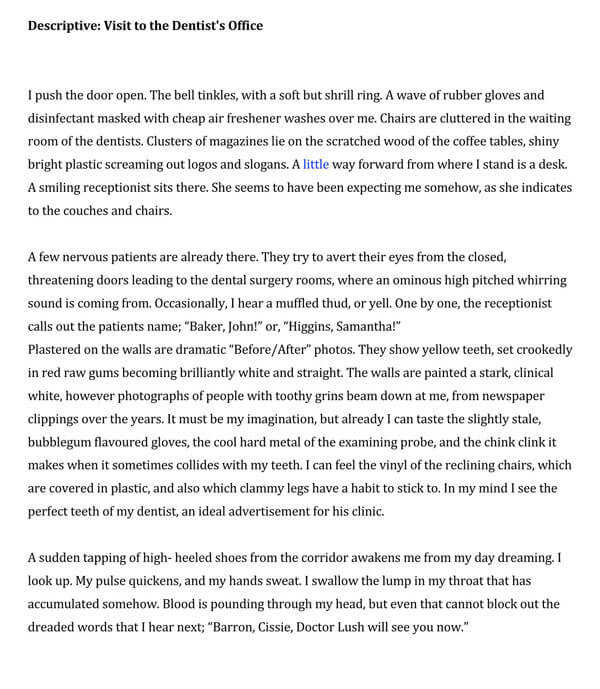
Purpose of Writing a Descriptive Essay
A descriptive essay enables writers to immerse their audience in their words with sensory details. It also enables writers to capture and share events with their audience vividly. The figurative language used in these essays helps the reader understand the writer’s story through visualisation, making the content more interesting to write or read.These essays also give writers almost unrestricted freedom of choosing the meaning of expressions through their sentence composition.
Type of Topics in a Descriptive Essay
These types of essays are a powerful way for writers to communicate their experiences. However, they must first decide what they are going to write about. The topics writers explore will help them plan out how they will write the essay.
Writers can therefore consider the following types of topics in a descriptive essay:
Personal descriptive essay
These essays detail a writer’s personal experience. The writer may describe an event, person, place, or object they love or care for. They provide a first-hand account of their experiences, making it a descriptive narrative that relies more on their memory than research.
EXAMPLE
It was past midnight, and I was sound asleep when I heard it, a subtle crackle of my living room floor. I sat up on my bed, opened my eyes to the pitch-black darkness of my room, my back open to the relative cold, I waited, hoping that it was nothing, but then I heard it again. My heart was pounding, but I had to find out who or what that was. So I slowly, carefully, and quietly tiptoed my way to my bed.
Imaginative descriptive essay
An imaginative descriptive essay details a fictional, historical, or fantastical situation. It can discuss anything from travel to civil rights.This essay is based on fiction, requiring the writers to depend on their creative ability to bring the essay to life.
EXAMPLE
The sky was still empty, not a single star, nothing but the bright shimmering light of the moon. The only reason it shone so bright was that it was inching ever so close. They walked along the river bed surrounded by a thick wilderness of trees, exhausted, but they couldn’t stop; they could feel it haunting them, slowly preying on them in the thick trees waiting for one of them to drop their guard.
Conceptual descriptive essay
This essay details a writer’s exploration of ideas and emotions. The writer is expected to carefully explore the concept and formulate a concise, exciting thesis. The sole purpose of the ideas explored in a conceptual descriptive essay is to provide a clear definition explanation.
EXAMPLE
Depression, it’s an empty, isolating, and hopeless feeling. Some days the heart is in a weightless existence, and then there are those days. Days when there is nothing but an overwhelming feeling of pain. It entraps you in your own body, and some say it as if they walk around with an open wound on their chest.
How to Write a Descriptive Essay
Writing this essay requires a writer to be creative and expressive. Therefore, the writer must follow a step-by-step process to ensure that the content is effectively conveyed.
Writers should consider adhering to the following process when writing a descriptive essay:
Select a specific topic
When writing a descriptive essay, writers should first select a topic that enables them to use colourful language and provides them with creative freedom. Writers must also consider who their readers are to ensure the topic aligns with their reader’s interests. The writer can then decide on a topic and write a thesis statement that will summarise their concept.
Collect information
Secondly, writers should collect information concerning the topic. Collecting information for essays can help writers find details that can be used during the writing process. Therefore, writers can provide vivid details concerning how an event occurred or the characteristics of the person, place, or object. The information also helps strengthen the essay’s contents by enabling the writer to provide names and dates.
Make an outline
Thirdly, an outline of the main points should be made. Outlining enables the writer to categories the information collected into individual paragraphs ahead of writing. This enables writers to plan and manage their writing time and identify what they cover. It also ensures that writers can focus on the main points covered in the essay’s body paragraphs.
Write an introductory paragraph
Next, such an essay must have an introductory paragraph. The thesis statement should be a part of the introductory paragraph. A good introductory paragraph should capture the reader’s interest in the descriptive essay.
Writers can use rhetorical questions or bold statements in the introductory paragraph to hook their readers. Using rhetorical questions in the introduction adds creative flair to the essay, while a bold statement draws extra attention to the provided information.
Write body paragraphs
The writer must then ensure that each paragraph of the main body of the essay has a topic sentence. The topic sentence spotlights the main idea of the paragraph, therefore, informing the reader of what it is about. A topic sentence also unifies the contents of the paragraph, therefore, ensuring a coherent order of sentences.
Concluding paragraph
The final paragraph of an essay should be an overall summary, drawing all the points together. Writers should use the final paragraph to reaffirm the essay thesis, indicating to their readers that they have achieved the essay’s goal. This paragraph is also the writer’s last chance to impress the reader.
Proofread your essay
Finally, once the writing is complete, writers must read the first draft of the descriptive essay to ensure its error-free. Proofreading also helps ensure that writers have properly conveyed their ideas, ensuring that the essay is of high quality.
Descriptive Essay Example
Descriptive essay about “a place I love”
I have always been fascinated with the great outdoors. A place like the Amazon rainforest, a vast tropical wilderness of trees with relatively small inclusions of vegetation like the savanna, grasslands, swamps, bamboos, and palm trees. This beautiful, luscious forest can be enormous, gentle, and sometimes scary.
I have enjoyed the beauty of nature since childhood; being in places like the Amazon has provided me with surreal experiences. However, to be in a vast forest that covers an area roughly the size of the USA, making it the largest rainforest on earth, is incredible. Walking through thick, moist vegetation and sometimes finding ourselves surrounded by an army of cutter ants hard at work with leaves on their backs as they march down the highway of trees was both scary and wonderful.
The warm climate of the amazon made wearing heavy clothing like jackets unnecessary and frankly impossible except at night when the temperature would drop dramatically. This warm climate makes the Amazon ideal for pesky tiny mosquitos; therefore, mosquito repellant is essential for anyone who visits. However, nothing could beat the fresh air filled with the smell of palm trees and wood.
When I first visited the Amazon, the paths weren’t defined; therefore, we had to use machetes to make our way through different jungle parts. However, one of the most incredible breathtaking moments was watching the sunset in an iron-made tower about 37 meters high where we could see the treetops.
To summarize my visit to the Amazon, the experience can only be fully described as wild, unforgettable, and sometimes even emotional. In the Amazon, nature meets beauty making the experience an inseparable part of the self.
Writers should consider going through descriptive essay examples before writing. Descriptive essay examples help writers understand how they can write certain types of essays. They also expose writers to good ideas, writing styles, and essay structure. Writers can also note down mistakes made by other authors, therefore, enabling them to improve the contents of their essays.
Writing Tips for a Descriptive Essay
When writing such an essay, writers should ensure they have a goal in mind. The goals set will help them assess if communication was effective or not. Setting goals will also help them form their thesis statement enabling them to establish their argument.
Writers should therefore consider the following tips when writing a descriptive essay:
Spend some time brainstorming
Once a topic for the descriptive essay has been selected, the writer should brainstorm by writing down some ideas about it. The writer can write down a few points breaking down the topic or key information about an experience that he/she wants to include in the essay. Brainstorming will help inspire creativity and enable the writer to compile a descriptive list for each word/piece of information.
Use of clear and concise language
This essay should be written in clear and concise language. This ensures that the content remains to the point. It also helps ensure that the writer sustains the reader’s attention. Using clear and concise language leaves no room for interpretation due to efficient communication by the writer.
Use of figurative and vivid language
This essay should enable the reader to visualize the contents on the page; this makes it necessary for the writer to use figurative and vivid language. Figurative language enables writers to use phrases that go beyond the literal meaning by using devices such as similes and metaphors.
This helps make the essay memorable, especially when the devices are used in an original manner. The use of vivid language such as a stroll in place of a walk can serve a distinct purpose of forming a firm image of the action in the reader’s mind.
Use your senses
The use of the writer’s senses during writing brings the content to life. Sensory details like sight, sound, smell, taste, and touch helps the writer form an image or evoke an emotion in the reader’s mind. It also helps the writer engage with readers’ human experiences, making them feel a part of the story.
Choose the right words
Each word used in an essay makes an impression on the reader; therefore, writers should carefully choose their words. The words used by the writer help the reader emotionally connect with the writer’s experience. The right words also help give credibility to the writing because readers can discern content written in clarity.
Relate the essay to what you were thinking
The contents of a descriptive essay should relate the thoughts of the writer with that of the reader. This helps create a connection between the two parties. Emotionally connecting with readers keeps them hooked to the essay and helps ensure effective communication of content.
Make a long-lasting an impression
A writer should strive to make a long-lasting and clear impression on the reader because the experience was effectively communicated. Writers are also able to evoke reader’s interest in their other essays. The impression writers make using this essay also enables them to impact the reader’s opinions.
EXAMPLE
If a writer’s essay describes a horrible experience with dolphins, readers are likely to fear encountering one.
Be organised
A descriptive essay should be organised to make it easier for the reader to understand the writer’s thesis. The organisation also makes it easier for the writer to put the essay together. Being organised ensures the flow of information between the writer and the reader; therefore, the essay’s goal is reached.
Frequently Asked Questions
Writers can select a descriptive essay by first deciding on a topic that they would like to cover. The topic can be chosen by thinking of a specific place, situation, experience, person, or emotion that the writer can interestingly describe. The topic may also have personal significance to the writer. When selecting a topic, the writer should ensure that he/she can provide a detailed description using particular features. If the topic is general or vague, it may disinterest the reader.
A descriptive essay has an introduction that must contain a thesis statement at the end, body paragraphs, and a conclusion. The body paragraph of an essay provides more details, while the conclusion reaffirms the essay thesis.
The key to writing a descriptive essay is a vivid description that enables readers to form a comprehensive picture of the events on the page. In addition, the description used enables the writer to appeal to the emotions of the reader.










